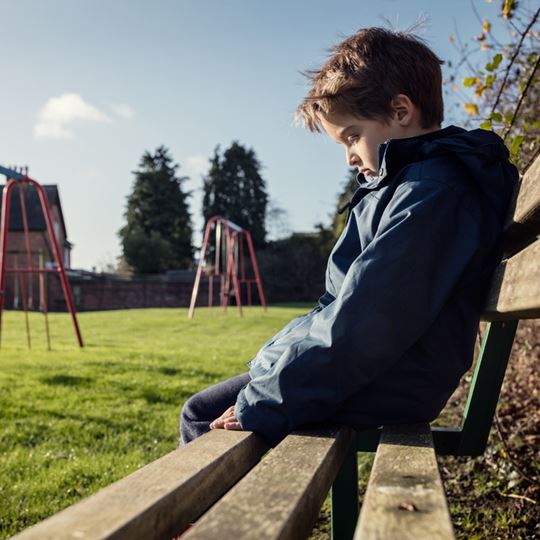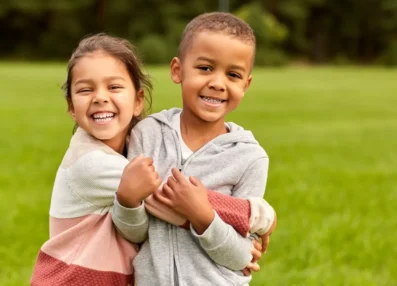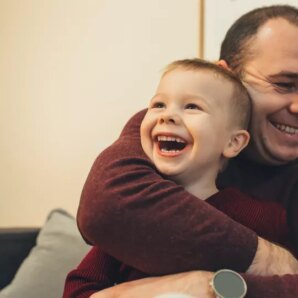What is bullying?
Bullying is when someone uses behaviour like violence or verbal abuse to intimidate and gain control of another person. It is often repetitive and can happen over weeks, months and years. Some victims of bullying may find it difficult to ask for help; they may think they can navigate the situation alone or worry about their bully finding out that they’ve asked for support.
Research shows that children in care are twice as likely to be bullied than their peers in primary school and four times more likely in secondary school. It’s important that bullying is addressed and dealt with as quickly as possible to mitigate the impact it has on those experiencing it. This is especially the case for children in care who are already dealing with the trauma of difficult childhood experiences.

Types of bullying
Bullying of all kinds can cause distress and harm to those on the receiving end. Some bullying behaviours are more obvious than others, which means it’s crucial to understand the different types of bullying so you can spot the signs and support the child in your care. These include:
- Physical – This means using violence to inflict injury, such as hitting, punching and hair pulling.
- Verbal – Using words to deliberately hurt someone’s feelings, such as insults, teasing and name-calling.
- Non-verbal – Using non-verbal gestures such as eye-rolling and staring to intimidate another person.
- Social – This involves using social situations to impact someone’s relationships, such as excluding them, spreading rumours or embarrassing them in front of others.
- Cyberbullying – This involves using mobile phones and the internet to send threatening emails and texts, troll their social media accounts, embarrass or shame them online or pressurise them into sharing sexual photos of themselves.
- Hate crimes – Some types of bullying are classified as hate crimes, and you may need to report them to the police for further investigation. Hate crimes include bullying someone because of their race, sexual orientation, gender identity, disability, or religion.
Why do people bully?
It’s important to remember that children and young people who bully others aren’t inherently bad. They are likely trying to fulfil a need or express their emotions through bullying another person. Here are some reasons why a child or young person may bully someone else:
- If a child or young person is having difficulties at home or has experienced bullying themselves, bullying may be their way of gaining a sense of control and expressing their frustrations.
- We rely on our caregivers to teach us how to manage our emotions and treat others. If a child or young person has witnessed, or been a victim of, bullying behaviour from a caregiver, they may mirror this behaviour by bullying others.
- If a child or young person has low self-esteem, they may belittle another person to boost their own self-confidence and worth, or to gain respect from their friends.
- If a child or young person feels unheard by the adults around them, they may bully another person to get attention, even if it means there may be consequences for their behaviour.
- If a child or young person is part of a friendship group that bullies others, they may participate to fit in and avoid rejection from that group.
- If a child or young person watches films and TV shows that glorify bullying, they may think this type of behaviour is acceptable.
- If a child or young person follows someone on social media who actively cyberbullies others, they may think it’s ok.
How to deal with bullying
We can reduce the impact bullying has on children and young people by intervening as soon as we suspect they are being bullied or bullying others.
It can be difficult for children in foster care to open up about their thoughts, feelings and actions. They may have been let down or felt ignored by a trusted adult in the past, struggle to verbalise their experiences or believe they can handle the situation alone.
It’s up to you to encourage open communication in the home by offering consistent, non-judgmental support and being curious about your child’s non-verbal cues. If your child is being bullied or bullying others, you may notice changes in their behaviour. Here are the signs to look out for and what you can do to tackle the bullying.

Signs your child is being bullied
A child experiencing bullying may have unexplained injuries and missing or damaged personal belongings. They may become jumpy if they receive a notification on their phone and withdraw from activities they usually love. Bullying can impact their eating and sleeping habits, and because most children experience bullying in schools, they may be reluctant to go. You may also see a drop in their academic performance and notice changes in their emotional and mental well-being.
Signs your child is bullying others
A child who is bullying others may return from school with additional belongings or money, unable to explain where they came from. They may spend long periods on their phone and be cagey about online interactions. Their behaviour may have changed since joining a new friendship group, and you may hear them speak negatively about classmates, calling their remarks a ‘joke’ when questioned. They may show a lack of respect for their teachers or act aggressively towards their siblings. The school may contact you about their behaviour, or the parent of a child they are bullying may approach you.
Talking to your child about bullying
If you notice signs that your child is being bullied or they’re bullying others, the first step is to have a conversation with them to find out what could be causing a change in their behaviour.
Use leading questions to encourage your child to engage in conversation, such as ‘What kind of experiences have you had with other people at school recently?’ or ‘What do you do if you see another child getting teased or left out?’ If they’re unwilling to discuss their experiences, let them know that when they’re ready to talk, you’ll listen.
If your child tells you they’re being bullied, reassure and remind them that it’s not their fault, and you’ll take steps to stop it from happening. At Fosterplus, we have resources to help children deal with bullying and provide training on bullying and cyberbullying, so you know how to spot the signs and support a child experiencing it.
Preventing bullying behaviours
If your young person is bullying others, they may be less willing to engage in conversation about their behaviour and may not even realise they’re bullying.
A child’s behaviour often reflects their past experiences and inner world. So, it’s crucial to look beyond your young person’s behaviour to understand how they’re feeling and why they are acting in a particular way. You can then implement positive behaviour management techniques to prevent them from continuing to bully others.
Here are some steps you can take to prevent bullying behaviours:
- Address their behaviour – Have an honest conversation with your child about their behaviour and why it’s considered bullying. Be mindful of your tone so they don’t feel shamed.
- Actively listen – Let your child explain their behaviour and demonstrate empathy for their thoughts and feelings.
- Help them empathise – Your young person may not realise how their behaviour impacts others. You could ask them how it would feel if they were experiencing this behaviour and give them time to reflect.
- Coping mechanisms – If your young person struggles to manage their thoughts and emotions, help them develop healthy coping mechanisms like exercise, journalling and mindfulness.
- Build self-esteem – Improve your child’s self-esteem by praising them for things they do well, no matter the size and recognising their strengths.
- Therapy – At Fosterplus, our therapists can help children work through past experiences that may be driving them to bully others.
- Access further support – When you foster with us, you have access to a team of experts, including social workers and experienced foster parents, who can provide guidance on preventing bullying behaviours.
Recovery from bullying
Does bullying go away? – Yes, we can stop bullying; however, it can take time to recover from bullying behaviours. Children and young people need support on their recovery journey to prevent a cycle of bullying and to mitigate the impact it can have on their well-being. Children who’ve bullied others also need support so they don’t slip back into bullying behaviours and heal from the root cause.
At Fosterplus, our support for foster parents means you’ll never face issues like bullying alone. Together, we can help children and young people build resilience and live without fear of bullying behaviours.
We’re dedicated to providing children with stable homes where they feel safe to be themselves and have the space to grow into thriving adults. If you’re interested in becoming a foster parent, enquire with our team today.





